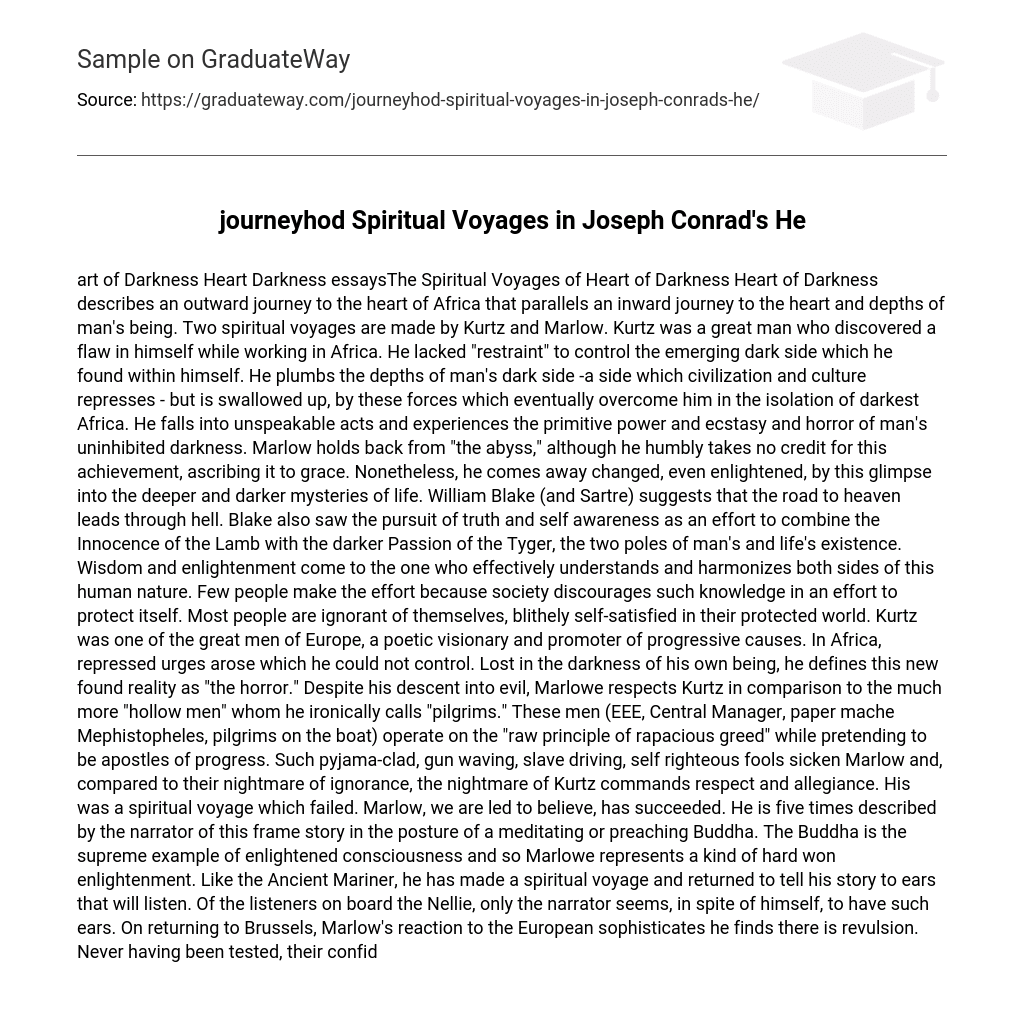art of Darkness Heart Darkness essaysThe Spiritual Voyages of Heart of Darkness Heart of Darkness describes an outward journey to the heart of Africa that parallels an inward journey to the heart and depths of man’s being.
Two spiritual voyages are made by Kurtz and Marlow. Kurtz was a great man who discovered a flaw in himself while working in Africa. He lacked “restraint” to control the emerging dark side which he found within himself. He plumbs the depths of man’s dark side -a side which civilization and culture represses – but is swallowed up, by these forces which eventually overcome him in the isolation of darkest Africa.
He falls into unspeakable acts and experiences the primitive power and ecstasy and horror of man’s uninhibited darkness. Marlow holds back from “the abyss,” although he humbly takes no credit for this achievement, ascribing it to grace. Nonetheless, he comes away changed, even enlightened, by this glimpse into the deeper and darker mysteries of life. William Blake (and Sartre) suggests that the road to heaven leads through hell.
Blake also saw the pursuit of truth and self awareness as an effort to combine the Innocence of the Lamb with the darker Passion of the Tyger, the two poles of man’s and life’s existence. Wisdom and enlightenment come to the one who effectively understands and harmonizes both sides of this human nature. Few people make the effort because society discourages such knowledge in an effort to protect itself. Most people are ignorant of themselves, blithely self-satisfied in their protected world. Kurtz was one of the great men of Europe, a poetic visionary and promoter of progressive causes.
In Africa, repressed urges arose which he could not control. Lost in the darkness of his own being, he defines this new found reality as “the horror.” Despite his descent into evil, Marlowe respects Kurtz in comparison to the much more “hollow men” whom he ironically calls “pilgrims.” These men (EEE, Central Manager, paper mache Mephistopheles, pilgrims on the boat) operate on the “raw principle of rapacious greed” while pretending to be apostles of progress. Such pyjama-clad, gun waving, slave driving, self righteous fools sicken Marlow and, compared to their nightmare of ignorance, the nightmare of Kurtz commands respect and allegiance. His was a spiritual voyage which failed. Marlow, we are led to believe, has succeeded. He is five times described by the narrator of this frame story in the posture of a meditating or preaching Buddha.
The Buddha is the supreme example of enlightened consciousness and so Marlowe represents a kind of hard won enlightenment. Like the Ancient Mariner, he has made a spiritual voyage and returned to tell his story to ears that will listen. Of the listeners on board the Nellie, only the narrator seems, in spite of himself, to have such ears. On returning to Brussels, Marlow’s reaction to the European sophisticates he finds there is revulsion. Never having been tested, their confidence and self control he sees as worthless ( as Kurtz’s turned out to be). They are protected by the “butcher and policeman.” The butcher kills for us and so supports the illusion that life is all sweetness and light; the policeman (neighbors, priests, parents etc.) is a force of repression and inhibition and as such promotes the illusion that mankind is essentially gentle and loving.
Shooting on our fellow citizens in the manner of the People’s Liberation Army in China (T. Square) was described as “unthinkable” and “beyond belief.” Kurtz and Marlow knew better. Marlow calls Brussels the “sepulchral city” because its citizens are in a tomb (sepulcher). They have not yet begun to live in the sense that they have not yet taken the first step toward self-awareness, a process requiring knowledge of both light and dark. Marlow’s first step came physically and symbolically with his first step past the Dantesque black ladies – his first step into hell.
His last step comes in his willingness to lie to Kurtz’s Intended, breaking a previously held principle. This lie is in defense of the other side of existence, pure innocence, as represented by the unenlightened but pure faith of Kurtz’s fiance. Marlow is a changed man. Like the mariner and his wedding guest, Marlow and his listener(s) (the narrator/us) have lost the superficial empty happiness of life before Africa and have gained a fuller but more troubling wisdom with his return to Europe. They are “sadder but wiser” men who seem to reflect Joseph Conrad’s own words about his trip to Africa that, “before-the Congo, I was a mere animal.”





